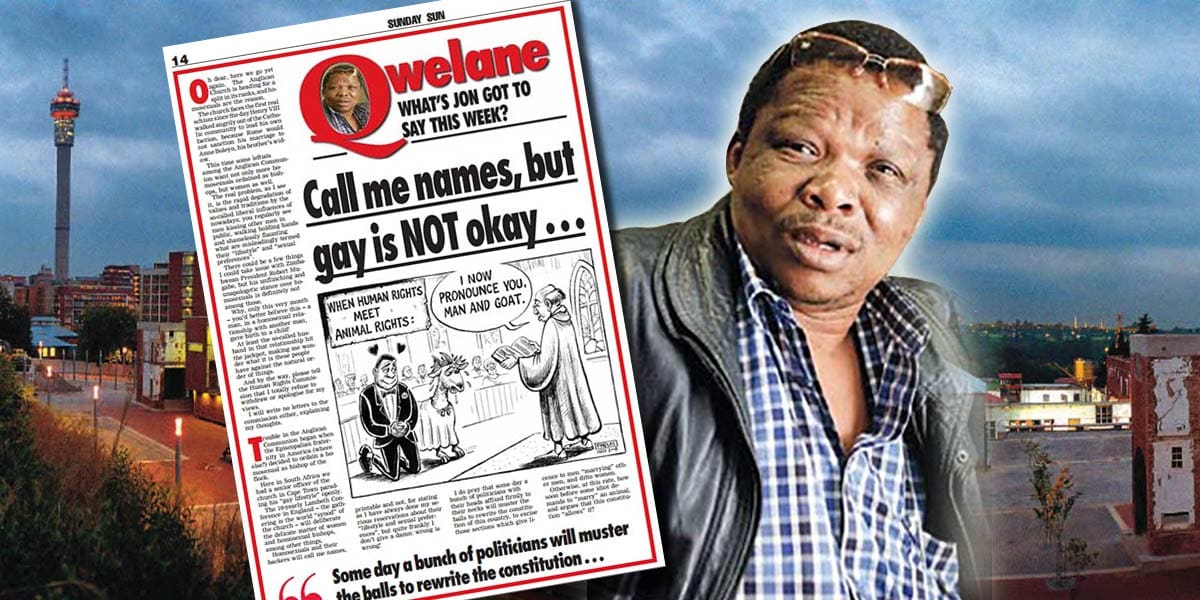Con Court: Jon Qwelane guilty but hate speech definition amended

In a long-fought victory for SA’s LGBT+ community, the Constitutional Court has upheld the Jon Qwelane hate speech conviction but ordered that the Equality Act be amended.
On Friday, the court found in a unanimous judgement that Qwelane’s 2008 article, Call me names, but gay is NOT okay, was indeed hate speech.
In the now-infamous piece, the late journalist suggested that homosexuality is similar to bestiality, said he supported Robert Mugabe’s homophobia and urged politicians to remove the sexual orientation equality clause from the Constitution.
The article outraged the LGBT+ community and, after receiving more than 350 complaints, the SA Human Rights Commission (SAHRC) instituted proceedings against Qwelane.
The decision brings to an end a matter that has been dragged through courts for more than a decade. Qwelane – who died in December last year – refused to apologise and remained unapologetic about his views till the bitter end.
He was first found guilty of hate speech by the Johannesburg Equality Court in April 2011. That was withdrawn on technical grounds later that year. He was again found guilty by the South Gauteng High Court in 2017. Qwelane and his legal team then challenged the constitutionality of the Promotion of Equality and Prevention of Unfair Discrimination Act (Equality Act) under which he was convicted.
In 2019, the Supreme Court of Appeal overturned Qwelane’s conviction and found that the section of the Equality Act dealing with hate speech was unconstitutional.
In Friday’s ruling, Justice Steven Majiedt said that the Constitutional Court had found Qwelane’s statements “to be harmful, and to incite harm and propagate hatred; and amount to hate speech as envisaged in section 10 of the Promotion of Equality and Prevention of Unfair Discrimination Act No 4 of 2000.”
Majiedt wrote that, “Mr Qwelane was advocating hatred, as the article plainly constitutes detestation and vilification of homosexuals on the grounds of sexual orientation. He was publicly advocating for law reform in favour of the removal of legal protection for same sex marriages. In doing so, he was undermining the protection of the law, the dignity of the LGBT+ community and the public assurance of their decent treatment in society as human beings of equal worth…”
However, the court also declared that section 10(1) of the Equality Act is “irredeemably vague” and unconstitutional to the extent that it includes the word “hurtful” in the prohibition against hate speech. It, therefore, removed the word from the act and gave parliament 24 months “to remedy the constitutional defect”.
Hate speech under the act will now be defined as “words that are based on one or more of the prohibited grounds, against any person, that could reasonably be construed to demonstrate a clear intention to be harmful or to incite harm and to promote or propagate hatred.”
Juan Nel, Unisa Research Professor of Psychology and a past president of the Psychological Society of South Africa (PsySSA) said he had not yet had a chance to study the judgement in full. (PsySSA was an Amicus Curiae in the case and presented evidence in court on the harm caused by hate speech.)
Nevertheless, Nel said, “as the hate speech provision stands – with minor amendments, that is – the judgement is indeed a victory for all those at the receiving end of hate speech.”
A portion of the costs was awarded to Qwelane because he was partially successful in his constitutional challenge.
The ruling could have a far-reaching impact. The long-awaited Hate Crimes Bill, which also addresses hate speech, has been stuck in limbo pending the Constitutional Court’s decision. The Department of Justice and MPs are now free to amend the bill if required and restart the process towards enacting this much-needed legislation.
The decision may also lead to the resumption of other hate speech cases, such as the one involving homophobic Western Cape Pastor, Oscar Bougardt. He was found guilty of hate speech by the Western Cape High Court in May 2018 and was given a 30-day jail sentence, suspended for five years. In October 2019, Bougardt was served with court papers for continuing to spew homophobia but the matter has since remained on hold.
“Speech has consequences for the speaker, for the audience and for society at large,” said Nel in a statement. “The article reflected a poisonous disrespect for [LGBT+ people’s] dignity as human beings, likening them to animals and their intimate relationships to bestiality. These are statements that undermine the dignity of every member of LGBT+ communities. They create fertile ground for hate crimes against LGBT+ individuals. They are also statements that thwart the constitutional project of developing a caring, respectful and tolerant society.”
Leave a Reply